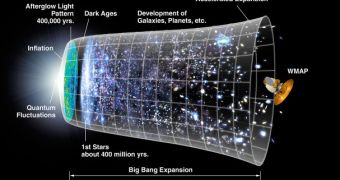It seems physicists around the world are predicting a grim future for our heirs who will want to learn more about space. Presuming that the human race will not survive for a few hundred or thousands of millions of years, it will be impossible for other beings to observe the Universe the way we do it now, from our galaxy.
This theory does have a lot of "ifs" attached to it, but it's just trying to present the future of skywatching in a few thousands of billions of years. Of course, "if" the human race will not live that long, and "if" other intelligent lifeforms will still be in this galaxy.
Due to the fast expansion rate of our universe, distant galaxies will eventually be moving away faster than the speed of light. It means that these galaxies will fall out of existence, but how will future intelligent beings study space?
Will a future species figure out if the Big Bang happened? Will they rediscover relativity? Lawrence Krauss, a theoretical physicist at Case Western Reserve University in Cleveland, Ohio and co-author of an article on the subject, says they will not be able to do it, since there will be nothing more for them to observe.
The problem will be the fact that all the galaxies outside of our own cluster will disappear in about 100 billion years, which will make this corner of the universe an island floating in the ever expanding space.
"They'll be stuck in an endless black void," Krauss said, "They'll feel very special after that happens, because our tiny cluster of galaxies will be the observable universe to them."
Aliens searching for clues of the universe around them will not know that their universe is still expanding. "It will be a sort of twisted situation, where thinking returns to what it was at the turn of the 20th century," he said.
So, it seems they will imagine the universe as being static, just like we did until 1920s. The answer to the question "Are we alone in the universe?" will be much simpler, as they won't see anything beyond their own cluster.

 14 DAY TRIAL //
14 DAY TRIAL //